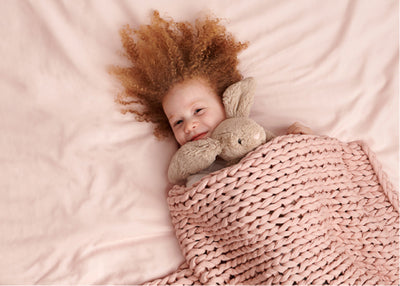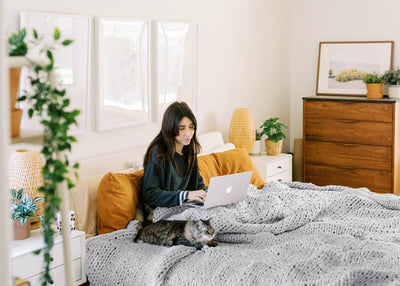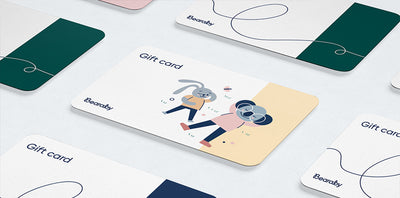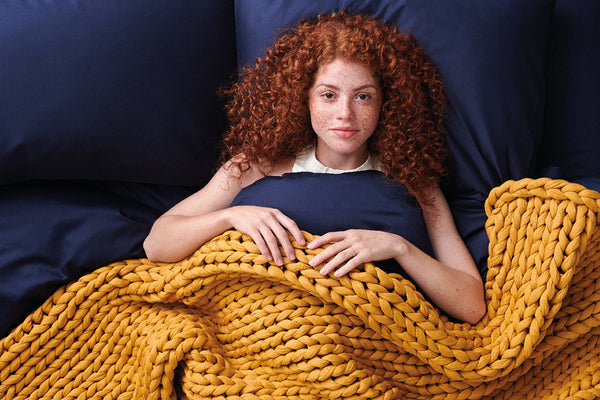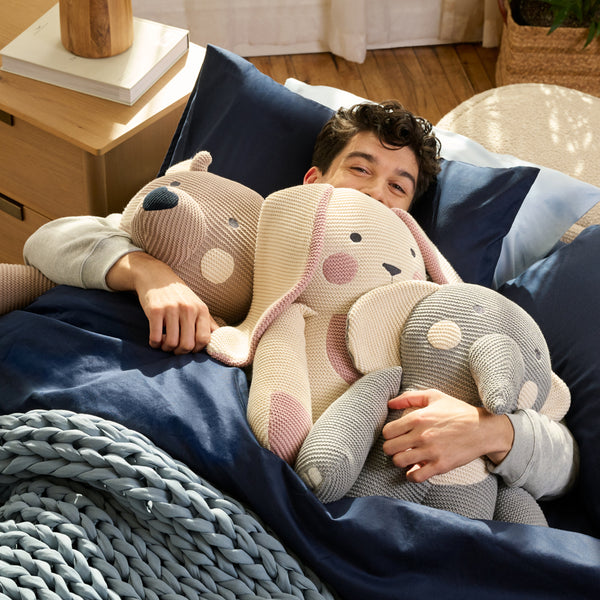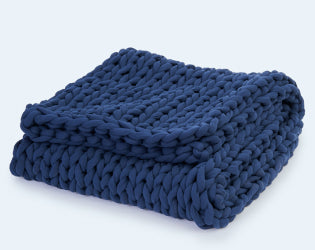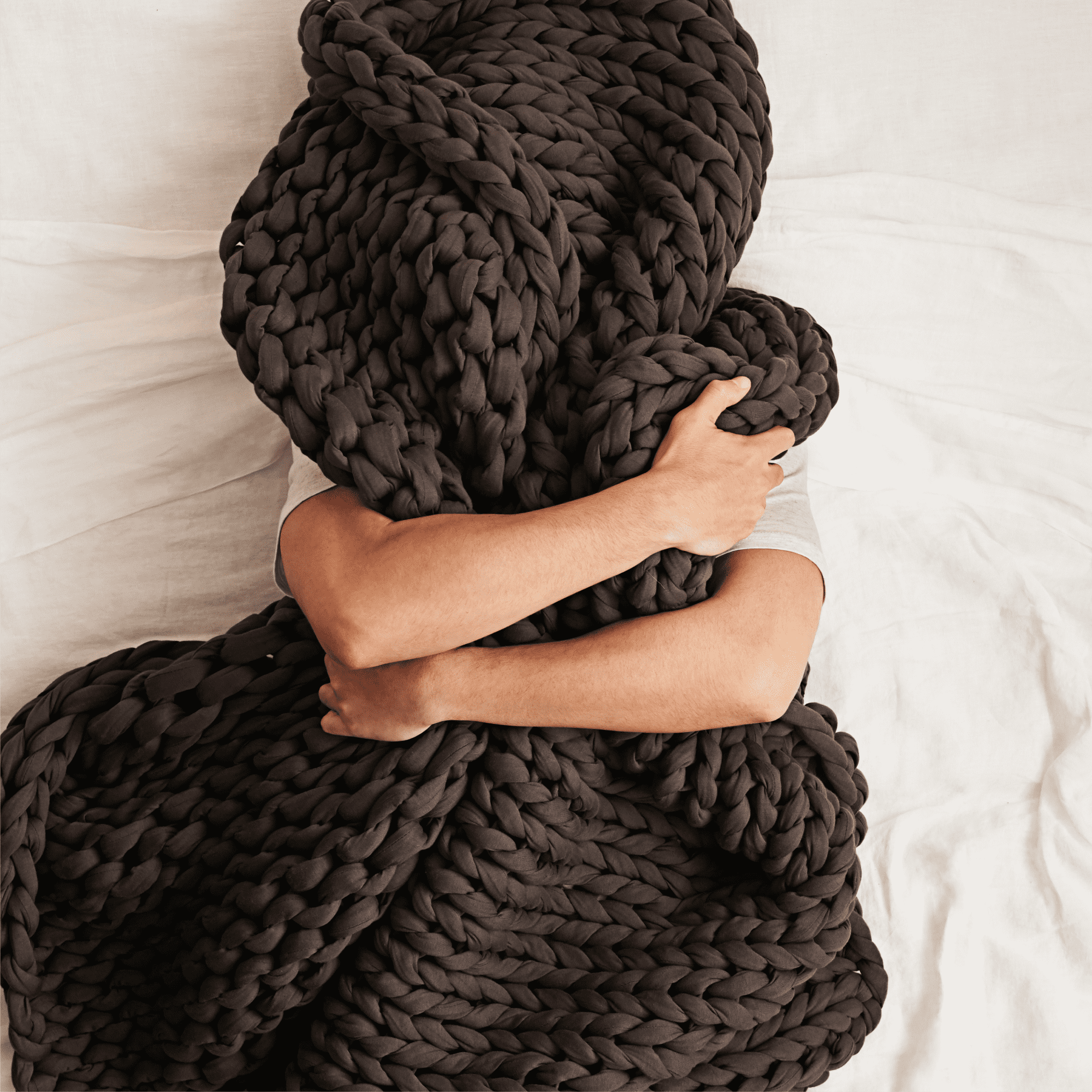Why Does Coffee Make Me Sleepy?
While coffee initially boosts your mood and physical performance, sometimes, it can have the opposite effect shortly after drinking it. If you’re wondering “Why does coffee make me tired?”, read on for details on all-things coffee and sleep!

Bearassentials
Coffee contains caffeine which stimulates your nervous system and makes you alert.
Excessive coffee intake can lead to an adenosine rebound, causing feelings of fatigue afterward.
Consider alternatives like tea, energy drinks, and dark chocolate as caffeine sources.
Did you know?
The Food and Drug Administration (FDA) recommends limiting your caffeine intake to 400 mg a day (4 to 5 cups) to steer clear of the potential side effects of drinking too much coffee.
Few rituals rival the comforting routine of sipping on a steaming cup of coffee every morning. The caffeine content in coffee boosts your brain’s alertness and helps you stay awake and productive. But… have you ever had one of those days when coffee makes you feel sleepy instead of awake? Can coffee even make you sleepy or is something else going on?
Well… yes! Coffee can make you feel sleepy, tired, and ready for a daytime nap! But why does this happen?
Let’s find out!
Caffeine Causes An Adenosine Rebound
The caffeine in coffee makes you feel awake and alert because it blocks adenosine. This is one of your brain’s chemical messengers that promotes sleepiness. A few hours after taking coffee, the caffeine wears off and adenosine is no longer blocked, so you start feeling sleepy and even more tired than before you had the coffee. This is what is known as an adenosine rebound, explaining why you feel sleepy after you’ve had coffee.
Coffee Can Promote Dehydration
When you drink coffee, it can act as a diuretic, which means it increases urine production. This leads to dehydration if you don’t drink enough water to make up for the fluid loss. Dehydration can make you feel tired and sluggish, similar to how you might feel when you haven’t had enough sleep.
Individual Sensitivity To Caffeine
We all vary in our ability to tolerate caffeine. While many people experience an increased level of alertness after having a cup of coffee, you may feel sleepy instead… especially if you’re not a regular coffee drinker. Your body may simply have unique chemistry and how it metabolizes caffeine may be behind your feelings of fatigue after taking coffee. Other signs of high caffeine sensitivity include nausea, anxiety, jitteriness, and a low mood.
Afternoon Coffee Can Cause Sleep Disruptions
Having a cup of coffee, especially in the afternoon or evening, can disrupt your sleep patterns. Caffeine can stay in your system for several hours, which is why you may have trouble sleeping later at night. This could lead to general feelings of tiredness the next day, which cannot be remedied even with a cup of coffee. Also, caffeine can affect the quality of your sleep by reducing the amount of deep sleep you get. Deep sleep is crucial for feeling rested and alert the next day, so a disruption in this phase of sleep can contribute to feelings of overall sleepiness during the day.
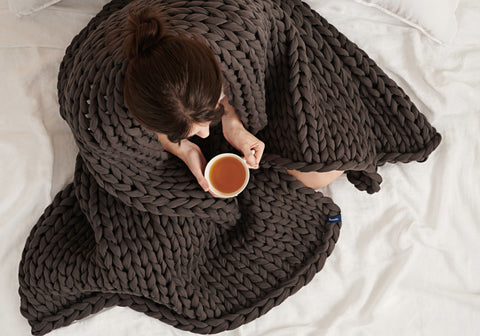
Coffee Aggravates Acid Reflux
Coffee is acidic and can therefore worsen acid reflux or heartburn in some people. This digestive comfort in itself is able to make you feel lethargic and unusually tired after you have had a cup of coffee or two. Acid reflux, which happens when stomach acid flows back into the food pipe, can also make it hard to fall asleep or take a nap… which means you may struggle with feeling restless after taking coffee.
You May Experience A Caffeine Crash
The initial boost of energy from caffeine can be followed by a “crash” as the effects wear off. This coffee crash can leave you feeling more tired than before you consumed the coffee. Since coffee stimulates the circulation of hormones like adrenaline, as the caffeine leaves your system, you may further feel fatigued in a few hours after taking coffee.
Coffee Does Not Solve Sleep-Deprivation
If you’re already sleep-deprived or have poor sleep quality, coffee might not be enough to counteract the effects of fatigue. In these cases, the underlying sleep deficit may override the stimulating effects of caffeine, leading to increased sleepiness. Although coffee can provide a quick pick-me-up, it is not an adequate substitute for sleep. Sleep deprivation can reduce alertness, slow down response times, and negatively affect thinking, which is why drinking more coffee in an effort to overcome tiredness might backfire.
It Could Be Your Coffee’s Composition
The type of coffee and how it’s prepared can affect its impact on your body. For instance, coffee with lower caffeine content and lower acidic levels may give you a boost of energy without a sudden crash later on. On the other hand, coffee that is too high in caffeine could be followed by an intense “crash” or feelings of lethargy caused by an acid reflux.
Sweeteners In Coffee Impact Blood Sugar Regulation
Coffee consumption can affect blood sugar levels, especially if consumed with lots of sugar in it. Fluctuations in blood sugar can contribute to feelings of fatigue or sleepiness. You should also consider not just the caffeine in your coffee but also the sweet and creamy additions to your brew! If your cup of coffee is adorned with whipped cream, honey, syrup, or a generous serving of sugar, the notorious sugar crash might be the reason.
Caffeine’s Psychological Association
Sometimes, the ritual of drinking coffee is psychologically associated with relaxation or winding down, especially if you have a habit of drinking coffee during breaks or leisure time. This association might signal to your brain that it’s time to relax and can induce sleepiness after drinking coffee.
So, if you’ve been wondering, “Can coffee make me tired?”. The answer is a resounding yes! It all comes down to how much coffee you drink, when you drink it, the sweeteners you add, and how strong the coffee itself is. Worry not though! If you find yourself stuck in the throes of an unhealthy coffee cycle that is affecting your sleep, a natural way to restore sleep health can be to use a weighted blanket like our Cotton Napper. The Napper is a chunky-knit evenly-weighted blanket that helps you calm down naturally and fall asleep faster, especially when you’re experiencing an afternoon energy crash from drinking too much coffee.
In the next section, we look at other ways to steer clear of post-coffee sleepiness and tiredness.
How To Avoid Sleepiness After Drinking Coffee
Can drinking too much coffee make you tired? Yes! Does this have to happen? No! Here are helpful tips to help you steer clear of feeling tired after having a cup of coffee:
1. Moderate Consumption: If you find that coffee makes you sleepy, then it could be that you’re having more than you need. To fix this, limit your coffee intake to moderate levels. Consuming too much caffeine can lead to a “caffeine crash” and increased sleepiness once its effects wear off.
2. Timing: Be mindful of when you consume coffee. Avoid drinking coffee too late in the day, especially after 2 pm. This is too close to bedtime and since coffee takes a while to leave your system, drinking coffee late in the afternoon can disrupt your sleep cycle and contribute to feeling sleepy later on.
3. Stay Hydrated: Drink plenty of water throughout the day, especially when consuming coffee, to prevent dehydration, which can exacerbate feelings of fatigue.
4. Pair with Food: Consume coffee with a balanced meal or snack. Pairing coffee with food can help regulate its absorption, reducing the likelihood of a rapid spike and crash in energy levels.
5. Monitor Sugar Intake: Be cautious of adding excessive sugar to your coffee, as rapid fluctuations in blood sugar levels can contribute to feelings of fatigue. Opt for minimal or no added sugar alternatives.
6. Consider Decaffeinated Options: If you’re sensitive to caffeine or consume coffee for its taste, consider switching to decaffeinated coffee or other caffeine-free beverages to avoid disrupting your sleep.
7. Exercise Regularly: Engage in regular physical activity, as exercise can help boost energy levels and improve overall sleep quality, reducing the need for excessive caffeine consumption.
8. Take Breaks: If you find yourself feeling sleepy despite drinking coffee, take short breaks to stretch, move around, or engage in stimulating activities to combat drowsiness.
9. Quality Coffee: Opt for high-quality coffee beans and carefully prepared brews. The freshness and brewing method can affect the caffeine content and overall enjoyment of the coffee.
Next, let’s look at factors to consider when choosing coffee that won’t make you sleepy.
How To Choose Coffee That Won’t Make You Sleepy
Here are some tips to help you choose coffee that keeps you alert longer while reducing the risk of overindulging:
1. Select a Higher Caffeine Content: Different coffee beans and blends contain varying levels of caffeine. Opt for coffee with a higher caffeine content if you’re looking for a more potent stimulating effect.
2. Choose Lighter Roasts: Lighter roasts generally contain slightly more caffeine than darker roasts because the beans are roasted for a shorter duration. If you’re aiming for higher caffeine content, opt for light or medium roasts.
3. Check the Origin: Coffee beans from certain regions, such as Ethiopia or Kenya, are known for their higher caffeine content compared to beans from other regions. Consider exploring single-origin coffees known for their robust and stimulating flavors.
4. Freshness Matters: Freshly roasted coffee tends to have more pronounced flavors and higher caffeine content. Look for coffee beans that have been roasted recently to ensure maximum freshness and potency.
5. Pay Attention to Brewing Method: The brewing method can impact the caffeine extraction process. Methods like espresso or French press typically result in higher caffeine concentrations compared to drip brewing. Experiment with different brewing techniques to find what works best for you.
6. Consider Cold Brew: Cold brew coffee is known for its smooth flavor and higher caffeine content compared to traditional hot brewed coffee. If you’re sensitive to acidity or looking for a caffeine boost without the jitters, cold brew might be a suitable option.
7. Read Labels: Some coffee brands specify the caffeine content on their packaging. Look for this information to choose coffee with the desired caffeine concentration.
8. Avoid Decaffeinated Coffee: If you're seeking a caffeinated pick-me-up, steer clear of decaffeinated coffee varieties. Instead, opt for regular coffee to ensure you're getting the stimulating effects of caffeine.
9. Trial and Error: Everyone’s caffeine sensitivity varies, so it may take some trial and error to find the right coffee that keeps you alert without causing sleepiness. Pay attention to how different coffees affect your energy levels and adjust your choices accordingly.
By considering these factors and experimenting with different coffee options, you can choose coffee that provides the desired stimulating effect without inducing sleepiness.
In the next section, let’s look at alternative ways to boost your alertness without consuming caffeine.

How To Improve Your Energy Levels Without Coffee
Here are some strategies to boost energy naturally:
1. Get Adequate Sleep: Prioritize quality sleep by maintaining a consistent sleep schedule and creating a restful sleep environment. Use sleep aids like weighted blankets to fall asleep faster and get deeper sleep. Consider our Cotton Napper, for instance, which is a chunky-knit evenly-weighted blanket whose gentle heaviness feels like a tight hug as you nap
2. Eat Nutrient-Dense Foods: Fuel your body with a balanced diet rich in whole grains, fruits, vegetables, lean proteins, and healthy fats. Incorporate foods that provide sustained energy, such as complex carbohydrates, fiber, and protein, while minimizing sugary snacks and processed foods that can cause energy crashes.
3. Manage Stress: Chronic stress can deplete energy reserves and lead to fatigue. Practice stress-reduction techniques such as deep breathing, meditation, yoga, or tai chi to promote relaxation and improve energy levels.
4. Take Breaks and Move: Sitting for prolonged periods can contribute to feelings of lethargy. Take short breaks throughout the day to stretch, walk around, or perform light exercises to increase circulation and combat fatigue.
5. Prioritize Mental Health: Addressing mental health concerns such as anxiety, depression, or mood disorders is essential for maintaining energy and vitality. Seek support from a therapist or counselor if needed, and practice self-care activities that promote emotional well-being.
6. Limit Caffeine and Alcohol: While moderate caffeine intake can provide a temporary energy boost, excessive consumption can lead to dependence and disrupt sleep patterns. Limit caffeine intake to moderate levels and avoid consuming caffeine or alcohol close to bedtime to promote restful sleep.
7. Stay Socially Connected: Interacting with friends, family, and supportive social networks can boost mood and energy levels. Schedule regular social activities or virtual hangouts to stay connected and combat feelings of isolation.
8. Practice Mindfulness: Cultivate mindfulness and present-moment awareness through practices such as meditation, mindful breathing, or mindful eating. These practices can enhance focus, reduce stress, and increase overall energy and vitality.
Feeling sleepy after consuming coffee is not considered normal for most people, so if you consistently feel sleepy after drinking coffee, it may indicate factors such as caffeine sensitivity, dehydration, disrupted sleep patterns, or underlying health issues that warrant attention.
In the next section, we list other sources of caffeine that you can consider if you tend to feel sleepy after having coffee.
Alternative Sources Of Caffeine
Here are various sources of caffeine along with their approximate caffeine content per cup. These values are estimates and can vary depending on factors such as brewing time, brand, flavor, and serving size:
| DRINKS | CAFFEINE CONTENT (mg) | SERVING |
|---|---|---|
| TEA | ||
| Black | 40 - 70 | 8 oz cup |
| Green | 20 - 45 | |
| White | 15 - 30 | |
| Oolong | 30 - 50 | |
| Yerba Mate | 65 - 130 | |
| SOFT DRINKS | ||
| Cola | 25 - 50 | 12 oz can |
| Mountain Dew | 54 | |
| Pepsi | 38 - 41 | |
| Dr Pepper | 36 | |
| CHOCOLATE | ||
| Dark Chocolate | 12 | 1 oz |
| Milk Chocolate | 6 | |
| White Chocolate | 0 | |
| Chocolate-covered espresso beans | 7 | Per bean |
| MEDICATIONS | ||
| Excedrin | 65 | Per tablet |
| Anacin | 32 | |
| Midol | 60 | |
| Paracetamol | 65 | Per 500 mg tablet |
| OTHERS | ||
| Matcha | 70 | 1 teaspoon |
| Guarana | 40 - 80 | 1 gram |
| Kombucha | 15 | 8 oz |
In the next section, we turn to a commonly-asked question about whether the temperature of your coffee can affect how you feel after.
Does Warm Or Iced Coffee Make Me Sleepy?
The temperature of your coffee, whether hot or iced, can have an impact on how quickly you feel its effects. Hot coffee can be soothing and relaxing, which might make you feel sleepy, especially if you’re already in a cozy environment or winding down for the day. Additionally, the warmth of hot coffee can have a calming effect on your body, potentially contributing to feelings of sleepiness.
On the other hand, iced coffee is usually more refreshing and can provide a quick burst of energy, which might temporarily counteract any sleepiness you're feeling. However, the cold temperature of iced coffee could also cause your body to work harder to maintain its core temperature, which might make you feel more tired in the long run.
Ultimately, the temperature of your coffee is just one of many factors that can affect how it makes you feel. The amount of caffeine, your overall hydration, and your body's individual response to coffee all play a role in determining whether coffee makes you feel sleepy or alert.
Conclusion
Over time, your relationship with caffeine will evolve. While you may typically be used to feeling more awake after sipping on a cup of coffee, you may begin to experience tiredness instead. If you start feeling sleepy after taking coffee, reduce your caffeine intake and opt for other activities to boost your energy levels.
Consider alternative sources of caffeine such as green and black tea, which have lower caffeine content. As always, limit coffee intake to mornings and before 2 pm to ensure it does not interfere with your sleep timing and quality at night.




